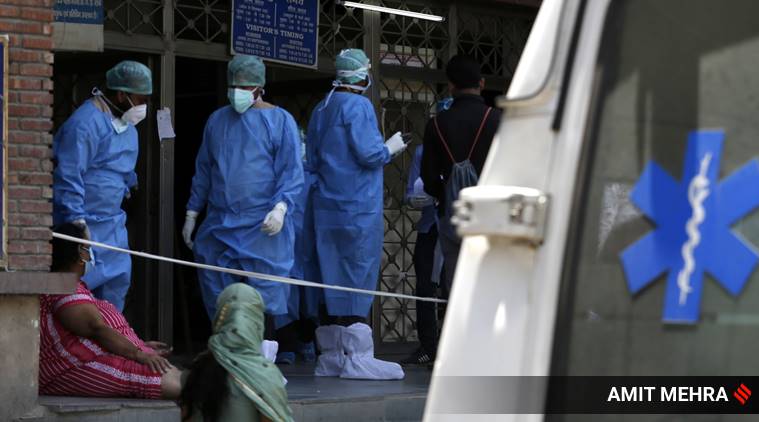 Medics attend to a suspected COVID-19 patient at a government hospital (Express Photo by Amit Mehra)
Medics attend to a suspected COVID-19 patient at a government hospital (Express Photo by Amit Mehra)
WITH AS many as 24 discharged patients and only one active case remaining in the district, the Panchkula health department has started conducting counselling of discharged COVID-19 patients as well as their neighbours to remove the stigma attached to the disease.
The decision to conduct home counselling of these patients was taken keeping in mind the incidents reported from across the country regarding the discrimination faced by those who recovered from COVID-19. “A general fear of the disease persists, not only among neighbours but also among family members of such persons. Due to this, there have been increasing complaints of anxiety, distress and worries in families as well as the neighbours,” says Dr MP Sharma, head of Psychiatry department at Civil Hospital, Panchkula.
At least 15 families in Panchkula have persons who have recovered from the disease and most of whom have already been visited by the counselling team. Almost 21 recovered patients, 40 family members and 60 neighbours have been counselled till now, under the initiative that began on May 19.
According to Sharma, the most common concern among family members and neighbours is whether the patient can turn positive again. “We have to explain to them about how the disease works. The chances of a COVID-19 patient becoming positive again at the end of the day is similar to any other person, he or she can again contract the disease from another infected person. Of course he cannot produce the virus on his own,” says Sharma.
Most of the neighbours reportedly have been supportive of the recovered patients and knew the difference between social distancing and social isolation, but few remained apprehensive about contracting the infection. “We assure such people that the recovered patients have tested negative twice, before they were discharged. Thus, getting infected from a recovered patient is highly improbable,” says Sharma. The health department team also advises people to maintain social distance, have respiratory etiquettes and hand wash regularly.
Speaking about a recovered student’s apprehensions, Sharma says, “One of the concerns which stood out was regarding a recovered patient who now has to join college. Both she and her family fears that her college friends may isolate her or may not mingle with her. This is a clear example of stigma this illness has.”
The team has come across many persons with anxiety disorders during their interaction with the recovered patient’s family members and neighbours. However, Sharma insists it is normal to be stressed or anxious during this period. The team taught relaxation exercises to those with mild anxiety issues, while those with moderate to severe anxiety issue were referred to OPD.
The process of visiting households will continue until all the recovered patients have been covered. “After visiting once, we are trying to be in touch with the recovered patients through phone,” he added.